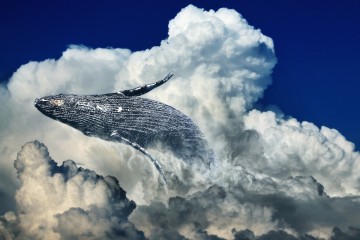"Science fiction allows me to help people get out of their cultural skins and into the skins of other beings," acclaimed author Ursula K. Le Guin once said.
Johns Hopkins anthropologist Anand Pandian agrees: Le Guin, who died Monday at the age of 88, was nothing short of an interplanetary anthropologist.

Image caption: Ursula K. Le Guin
Image credit: Wikimedia Commons
"When we attend to their anthropological inflections, to the fate of the human in [Le Guin's] stories, we may glimpse a moral project of empathy at work, one related in spirit to anthropology itself," he writes in an obituary for Le Guin published online in Anthrodendum.
In his tribute, Pandian, an associate professor in JHU's Krieger School of Arts and Sciences, shares fan letters he came across while studying Le Guin's archives at the University of Oregon.
The letters, he says, reveal an audience invested in the cultures, biologies, environments, and inner lives of the fantastical characters and worlds Le Guin conjured up.
He writes: "As one young woman wrote from Switzerland, explaining why Le Guin had led her to study anthropology in Neuchatel, 'with your books I have found out that science fiction is anthropology. To describe another world, it is learning about our own world.'"
Pandian describes his own experience reading Le Guin's work, and how he, too, came to recognize that understanding the worlds in her fiction enhances the understanding of our own.
From Anthrodendum:
Read more from AnthrodendumCity of Illusions, one of Le Guin's first novels, begins as a man with yellow, cat-like eyes finds himself in the midst of an unknown settlement of forest-dwellers. You may wonder with some suspicion why this unnamed world has pine and hemlock trees, herds of sheep and cattle, expanses of a landscape the novelist calls prairie. And then you read, midway through, that there are also ancient remnants here of a time that passed some three thousand years before, that "fragments of pottery, flecks of colored glass and plastic were thick in the spongy ground around these places." You begin to realize that you are still on this Earth, "a great lovely garden gone all to weeds and wilderness," long past "The Age of Cities" and "the Age of War" (Le Guin 1996).
And so you continue to wander across the face of the world with this cat-eyed foreigner, meeting herdsmen who land their raw beef repasts with hand-lasers, island natives "entirely absorbed in sailing, swimming and sex," and a telepathic race masquerading as demons to lord over them all. What is it to gaze at them through the peculiar yellow orbs of this stranger? Their humanity is vexing, yes, these peoples of an Earth yet to come, but make no mistake, what is truly at stake here are the horizons of our own perception now.
Posted in Arts+Culture, Voices+Opinion
Tagged anthropology, science fiction








